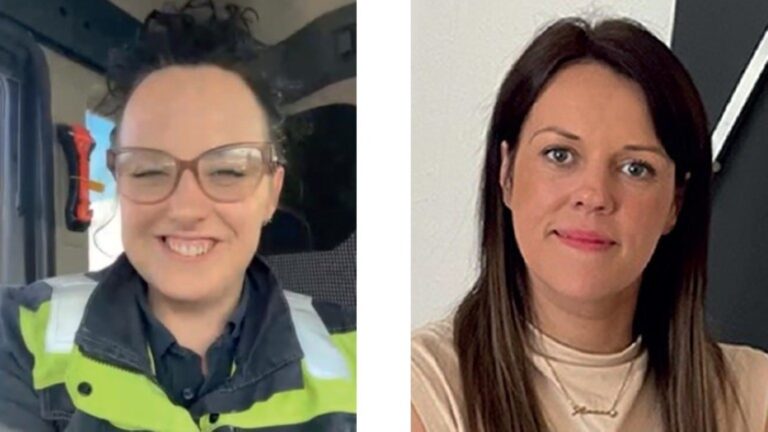
It is likely that most people still imagine a man, perhaps older, tough, practical. That image is not just outdated; it’s holding the industry back.
In a sector that has its struggle with driver shortages and an ageing workforce, the liquid fuel distribution industry needs to create space. It needs new faces but finding the right drivers for the specialised needs of fuel logistics can be a challenge. Sometimes, the solution arrives quietly, without a headline, like Zoe Challinor, one of the few female fuel tanker drivers in the South West.
We spoke with the team from Rapid Start Recruitment, the petrochemical logistics specialist which represents Zoe, to hear how inclusive recruitment can help alleviate some of the industry’s challenges.
Rapid Start regards itself as “more than just a driver recruitment agency” taking a comprehensive approach that goes beyond simply filling vacancies. Marketing Specialist Eraj Lodhi explains how this approach is alleviating sector pressures and proving beneficial to distributors, drivers and customers.
Rethinking who belongs
Across the UK, haulage and distribution face an urgent staffing crisis. The problem isn’t just about the number of drivers leaving the workforce, it’s about who’s coming in next.
Beth Simpson, director of women-led agency Rapid Start Recruitment, puts it bluntly:
“We’re running out of drivers. The average age is rising. We need a new generation and we’re missing out on half the population by not actively including women.”
Despite increased awareness, cultural and structural barriers remain. Job ads still lean heavily on masculine language and imagery. Facilities aren’t always equipped for female staff. Many companies still see diversity as a “nice-to-have,” not a business imperative.
Zoe’s experience proves what’s possible when that mindset shifts.
Zoe’s journey: From call centre to tanker driver
Zoe never set out to break barriers, she just wanted a job she’d love.
“I was working in customer service, bored stiff,” she says. “I’ve got a bit of ADHD, and office jobs just didn’t suit me. I’d see the big trucks go by and think, ‘That looks fun.’ When I inherited some money, I finally had the chance to get my licence.”
In 2017, Zoe passed her HGV test and, after six years in distribution, she moved into fuel tankers. She’s now been driving fuel for two years and is loving it.
“It’s probably the best job I’ve had,” she says. “The customers are great, I feel independent, and I get to contribute something real.”
But Zoe’s path hasn’t been without its bumps.
Invisible and isolated
At first, it was lonely.
“I came from a call centre full of people to being completely on my own, working in a male-dominated space,” she recalls. “The guys were older, married, nice, but distant. I wasn’t really part of the banter. It felt isolating.”
And then there were the quiet biases.
“People stared. One man said, ‘You did well getting in there’, like I’d broken into something forbidden. Others offered help I didn’t need. They meant well, but it was patronising. Would they offer that to a male driver?”
Zoe didn’t let it stop her, but the message was clear: this wasn’t a space built with women in mind.
A different kind of recruitment
Zoe’s experience changed when she joined Rapid Start Recruitment, a specialist agency that’s doing things differently.
“They didn’t just throw me into shifts and disappear,” Zoe says. “Beth and the team checked in every week. It didn’t feel like I was working for an agency, it felt like I was part of a company.”
For Beth, that’s by design.
“We’re not just filling vacancies. We build relationships, from day one. We listen to drivers’ stories, understand what they need, and work to place them where they’ll thrive. That kind of care attracts women. But really, it helps everyone.”
Rapid Start’s women-led leadership gives them a unique lens on what’s often overlooked.
“Language matters,” Beth explains. “From job ads to everyday conversations, how you speak tells people whether they’re welcome. Something as simple as ‘Nice work, love,’ might sound harmless, but it undermines professionalism and reinforces stereotypes.”
The industry lens: What needs to change
Zoe’s success isn’t just a personal win, it’s proof that inclusive recruitment works.
“We’ve seen a shift,” Beth says. “After placing Zoe, one client came back and asked for more female drivers. They saw the results, and it opened their minds.”
One of those clients is JW Suckling Transport, where Zoe is now a valued part of the team. Connor Sach, Business Development Manager at JW Suckling, who oversees Zoe’s work in the business, says:
“In this industry, it can be difficult recruiting and finding employees that share the same values as our company. Since Zoe joined Suckling Transport, she has been a pleasure to work with, always going the extra mile, being flexible, and assisting at any request. Zoe shows her commitment to the company every shift, and we are very pleased to say she is a part of the Suckling family.”
Zoe’s placement with JW Suckling isn’t just a cultural success, it also mirrors a broader shift. In one similar case, a nationwide distributor who had never employed a female tanker driver before not only filled a long-standing vacancy more quickly, but also received positive customer feedback, a reminder that inclusive recruitment delivers real, practical benefits.
But barriers persist. Rapid Start regularly advises clients on job description audits, inclusive imagery, and adapting onboarding processes to be more accessible. They also challenge assumptions around physical ability, availability, and long-term commitment.
“We’ve heard it all, that women can’t do the hours, that they’re not strong enough, or they’ll leave for family reasons,” Beth says. “It’s not true. What women need is opportunity, not special treatment.”
Sara Emma, also from Rapid Start, adds:
“We don’t recruit men and women differently. We treat every candidate with the same level of respect and care. What makes us stand out is how we listen. That’s what builds trust.”
Advice for employers: from the ground up
Zoe believes the industry can be welcoming, but employers have to make the first move.
“Women are out there,” she says. “They just don’t always see that this is for them. The best thing companies can do? Make it obvious that women belong.”
Beth agrees, and offers five practical steps:
- Audit your job ads: Is the language neutral? Do the images show diversity?
- Look at your onboarding: Are women supported with proper facilities and gear?
- Engage your staff: Educate leadership and drivers about unconscious bias.
- Build relationships: Weekly check-ins, open lines of communication, and candidate care go a long way.
- Celebrate your wins: Sharing success stories like Zoe’s creates visibility and builds momentum.
Zoe’s words to the next generation
When asked what she’d say to other women considering the role, Zoe doesn’t hesitate:
“Just go for it. Don’t worry about people staring or commenting. If it’s something you want to do, do it. You’ll find your place.”
She’s not asking for special rules, just a fair shot.
“We can do the job. We’ve always been able to. What we need now is to be seen.”
A strategic advantage
The fuel distribution sector doesn’t just need new drivers, it needs new thinking.
Zoe’s story shows what happens when someone is given a real opportunity, and when recruitment goes beyond just checking boxes.
As Beth puts it:
“Inclusive recruitment isn’t just the right thing to do, it’s smart business. It solves real problems, brings in fresh talent, and strengthens companies from the inside out.”
It’s a belief that Rapid Start puts into practice daily, not just by placing candidates, but by educating employers, challenging outdated assumptions, and building a more inclusive future for the fuel distribution workforce.
For an industry defined by movement, the question is simple: Are we ready to move forward?
Image credit: RapidStart Recruitment, Zoe Challinor
